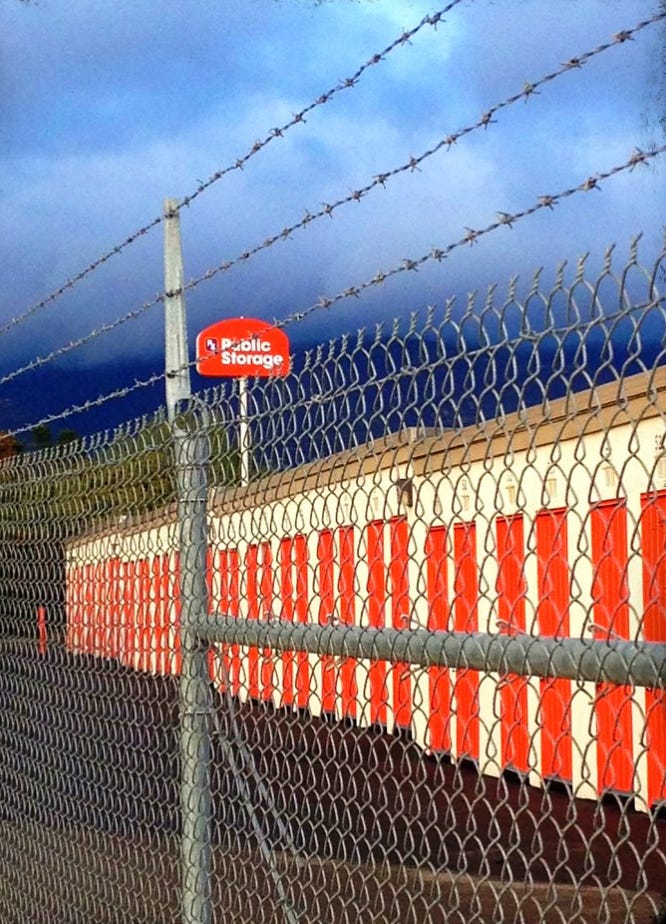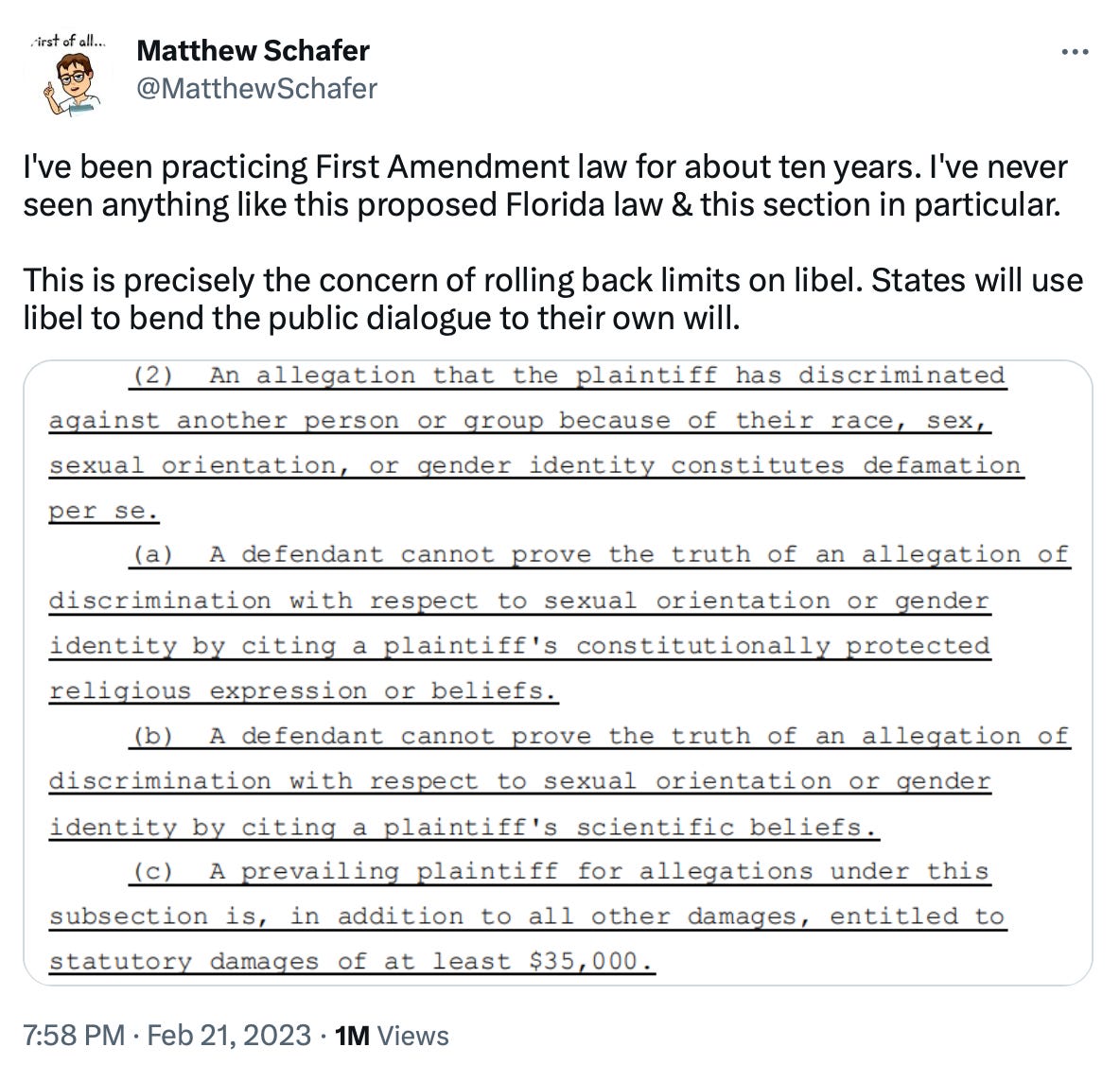Ron DeSantis wants people to stop suing insurance companies — and start suing newspapers
The Trade Show (2023 ed.), Vol. 6

This is “The Trade Show,” a weekly collection of shorter news nuggets and stories from other outlets around the state and country about the special interest-driven issues that lawmakers spend most of their time working on. The name comes from something a mentor once told me before I covered my very first session of the Florida Legislature more than 20 years ago: “Ninety percent of what goes on up here is a trade show.” As always, our content here at Seeking Rents is free to all readers. But please consider a paid subscription to support our work, if you can afford one.
Earlier this month, Gov. Ron DeSantis called on the Florida Legislature to end “lawsuit abuse” in Florida. And the very first thing DeSantis said he wanted to do was eliminate something known as “one-way attorney fees” in any lawsuit targeting an insurance company.
We’ve talked about one-way attorney fees before. But they are, at their core, a kind of legal sledgehammer that help individual Floridians fight back against insurance carriers that refuse to pay claims.
DeSantis claimed one-way attorney fees get abused. “Activist attorneys abuse Florida’s one-way attorney fee statute to prey on vulnerable Floridians to prolong litigation to increase their profit margins,” the Governor’s Office said in a statement.
But now the Republican governor and impending presidential candidate wants the Legislature to establish a new scheme of one-way attorney fees — in lawsuits targeting newspapers, televisions and other publishers.
Last week, Republicans in the state House of Representatives introduced a bill that would revoke historic legal protections for journalists and make it easier to sue people for defamation and libel. Much of the legislation, which records show initially came from DeSantis’ office, is intentionally unconstitutional and designed to provoke an eventual showdown before the United States Supreme Court.
This bill would make some brazen and chilling changes. It tries to force journalists to reveal anonymous and scare victims of discrimination into silence. And it institutes one-way attorney fees in defamation and libel suits.
Let’s say someone sues a news organization for defamation. Maybe he’s a rich coal industry executive angry at a comedy news show. Under this bill, if the coal executive wins, he could force the television show to pay his attorney fees. But if the television show wins, it cannot do the same.
But the legislation is even more insidious than that.
Because it would also, subtly, undo a two-decade-old state law that prevents wealthy interests like real-estate developers and industrial polluters from crushing public criticism by burying people in bogus defamation suits.
This kind of retaliatory litigation — which is often aimed at everyday Floridians who are trying to stop some action before a city council or water-management board — is known as a “SLAPP” suit. The acronym stands for “Strategic Lawsuits Against Public Participation.”
Under Florida’s current anti-SLAPP laws, if you are sued for defamation, you can ask the judge to have the suit dismissed as an illegal SLAPP lawsuit.

There’s a bit of risk to both sides. If the judge agrees with you and tosses the suit, you can then make the person who sued you pay your attorney fees. So this frivolous lawsuit didn't cost you money, and the person who filed it paid a financial penalty.
But if the judge decides that the person suing you has a legitimate claim and allows the lawsuit to go forward, you might have to pay their legal fees.
HB 991 would shift all the risk to you. If you win your SLAPP motion, you would no longer be able to make the person suing you pay your legal bills. That means you’ll pay out of your own pocket to defend yourself — even though you were hit with a frivolous lawsuit that a judge ruled never should have been filed in the first place.
But if you lose your SLAPP motion, you might still have pay the other side’s legal bills.
This is utterly nonsensical. It would make Florida’s anti-SLAPP law meaningless.
And that’s not something that will just hurt journalists.
Attorney fees for me but not for thee
This is part of a broader pattern in which DeSantis and Republican leaders in the Legislature are weaponizing attorney fees to encourage lawsuits against some people — but discourage them against others. Here are two more examples:
The Florida Senate is rapidly moving a bill that would, among other things, make it easier for a business to sue a city or county that passes a local law the business doesn’t like. That legislation would allow the business to force the city or county pay it up $50,000 in fees and damages.
At the same time, a committee in the Florida House last week advanced a bill that would make it riskier for people to fight land-use changes requested by a real-estate developer. Under HB 359, a group of residents or environmental activists who unsuccessfully sue to stop a city or county from amending its comprehensive plan could be made to pay the government’s legal fees.
(This particular legislation would be made even more dangerous if the Legislature defangs Florida’s anti-SLAPP law, too.)
By the way, there’s another place where Florida has traditionally allowed one-way attorney fees: Lawsuits seeking public records from the government.
Right now, if a state agency refuses to provide public records — or drags its feet on fulfilling a request for an unreasonable length of time — you can sue to force the agency to turn everything over. And if you win, the court can make the agency pay your attorney fees.
The point is make sure that agencies comply with public-records requests in good faith.
But Ron DeSantis may take aim at that law, too.
When it rains…
More bad news for the newspaper industry: Bills have been filed in both the House and the Senate that would allow self-storage facilities to stop buying ads in local newspapers before they auction off the contents of a delinquent storage unit.
Right now, self-storage companies must advertise a pending auction at least once a week for two straight weeks in a local newspaper before they can sell off all the stuff in a unit that has stopped paying rent. But the self-storage industry has been lobbying for years to kill this requirement and let storage facilities publish auction notices on other websites instead.

DeSantis and the Florida Legislature gleefully got rid of an old law last year that forced cities and counties to buy ads in local newspapers before they took actions like rezoning land or raising property taxes.
Sure seems like they’ll be happy to take up this cause, too.
A tax cut that failed to trickle down
A year ago, DeSantis and the Legislature agreed to cut taxes on the sale of new mobile homes — slashing the state sales tax from 6 percent to 3 percent.
It was a substantial tax break: Economists said it would cost the state nearly $20 million a year in lost revenue. But lobbyists for the mobile home industry pitched it as a way to help ease Florida’s affordable-housing crisis.
Specifically, the Florida Manufactured Housing Association commissioned a report predicting that a 3 percentage point cut to the sales tax would lead to a 3 percentage point reduction in the price of a new mobile home.

The tax savings, they claimed, would bring the price of a new mobile home within reach of nearly 40,000 more Florida families.
“The research team estimates that after the tax reduction, an additional 39,573 families will be able to afford a new manufactured home in Florida,” economic forecasters at Florida State University wrote in the report, which turned up in a recent public-records request.
But some early evidence suggests that didn’t happen.
Earlier this month, mobile-home giant Equity LifeStyle Properties Inc. revealed to its investors that it raised prices more sharply in Florida last year than anywhere else in the country.
Chicago-based Equity, which owns more than 50,000 mobile-home sites in Florida and turned a $285 million profit in 2022, said it raised prices by 22 percent nationally — but by 28 percent in Florida.
Another industry giant — Michigan-based Sun Communities Inc., which owns nearly 40,000 mobile home and recreational vehicle sites in Florida — revealed last week that it raised prices by more than 14 percent last year. Sun didn’t break out a Florida-specific increase.
It may not surprise you to learn that Equity LifeStyle Properties and Sun Communities are two of the largest donors to the Florida Manufactured Housing Association, which campaign-finance records show gave more than $800,000 to Florida politicians and political parties during the 2022 elections.
The FHMA’s donations included $375,000 to the various arms of the Republican Party of Florida, plus another $75,000 directly to DeSantis.
To be fair, there are obviously a lot of factors, most of them much bigger than taxes, that influence the price of a product. Equity and Sun don’t represent the entire mobile home industry. And the FSU forecasters hired by the mobile-home lobbyists said in their report that it might take some time before the tax break trickled down to buyers.
But they also warned that buyers might never see any savings at all.
“One of the key problems with any tax change is that both buyers and sellers will change their behavior in response to the tax change,” the FSU forecasters wrote in their analysis. “In particular, manufactures may be able to raise their prices in order to absorb some of the benefit of the tax change…In the worst-case scenario (from the perspective of buyers), manufacturers may be able to absorb the entire benefit of the tax reduction.”
The DeSantis Playbook
Stop me if you’ve heard this one before:
Last summer, Ron DeSantis replaced the entire board all at once at a local housing agency in Pinellas County. The new DeSantis appointees then hired a former Republican elected official to be executive director even though he had little housing experience. And they gave him a salary nearly double that of the previous director.
Welcome to the club, Pinellas County Housing Authority. New College of Florida and Orlando International Airport can show you around.
Oh, and red-flag alert: “DeSantis’ office did not respond to questions sent by email. His office has yet to comply with public records requests for board member applications.”
Read: DeSantis purged Pinellas’ public housing board long before New College overhaul (Tampa Bay Times)
‘Fuzzy math’
One of the questions to watch this session will be whether the Legislature’s Republican leadership allows independent state economists to “score” their plan to offer taxpayer-funded vouchers to every family in Florida, regardless of income, with kids in private school or home-schooling.
The Florida Policy Institute, a left-leaning think tank, warns that Florida’s vouchers-for-all experiment could cost $4 billion — with much of that money ripped from traditional public schools.
Staffers in the Republican-controlled Florida House Representatives countered this week with an estimate of “just” $209.2 million.
But the House analysis seems to assume that half of Florida families will turn down free money.
Read: House puts price tag on universal school voucher plan critics find hard to believe (Palm Beach Post)
Public policy and personal finances
While we’re on the subject of pumping public money into private schools, it turns out that two Orlando-area Republican lawmakers supporting universal vouchers have deep ties to Christian academies that already receive hundreds of thousands of dollars through the program.
Read: Central Florida GOP lawmakers with ties to private schools vote for voucher expansion (Orlando Sentinel)
Nothing to see here
The governor’s janitors came through for him in this month’s special session.
Read: After legislative fix, court dismisses lawsuit against DeSantis over migrant flights (Miami Herald)
and
Read: Miami Herald wins Polk Award for investigation into Gov. Ron DeSantis’ migrant flights (Miami Herald)
A win for Waste Pro
We end this week with your periodic reminder to pay attention to local reporting.
Read: Nate Monroe: Lobbying effort lands financial win for Jacksonville trash hauler (Florida Times-Union)





